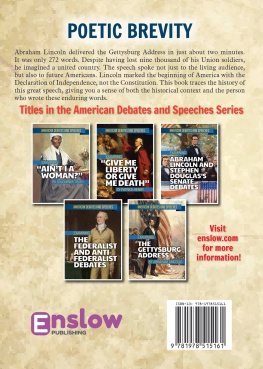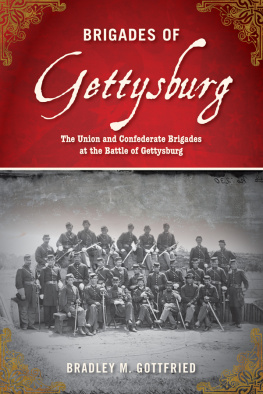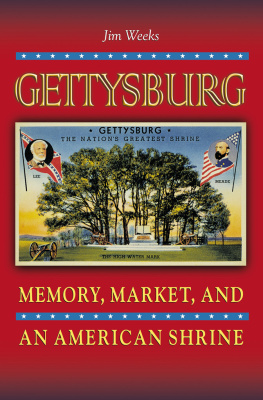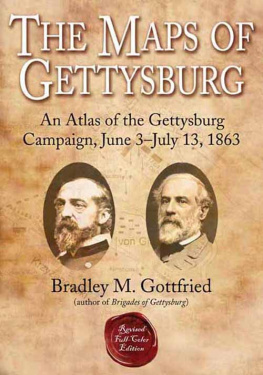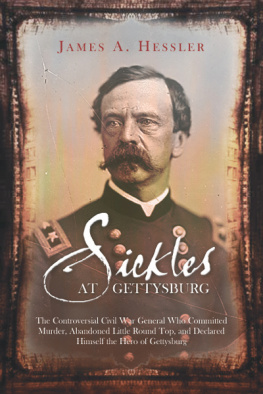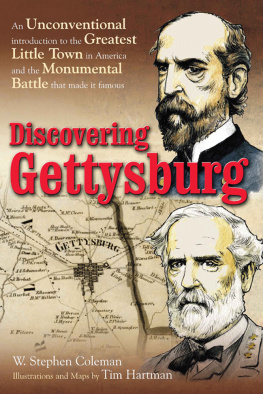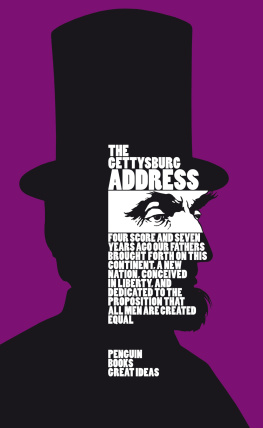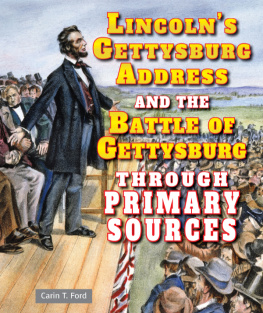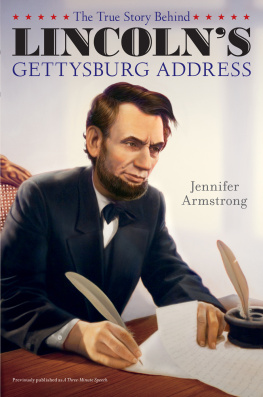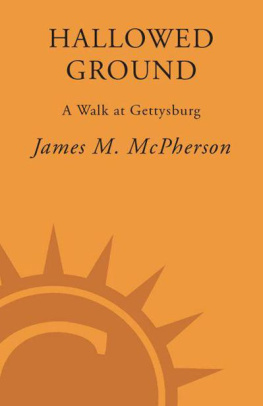Contents
Guide
Pagebreaks of the print version
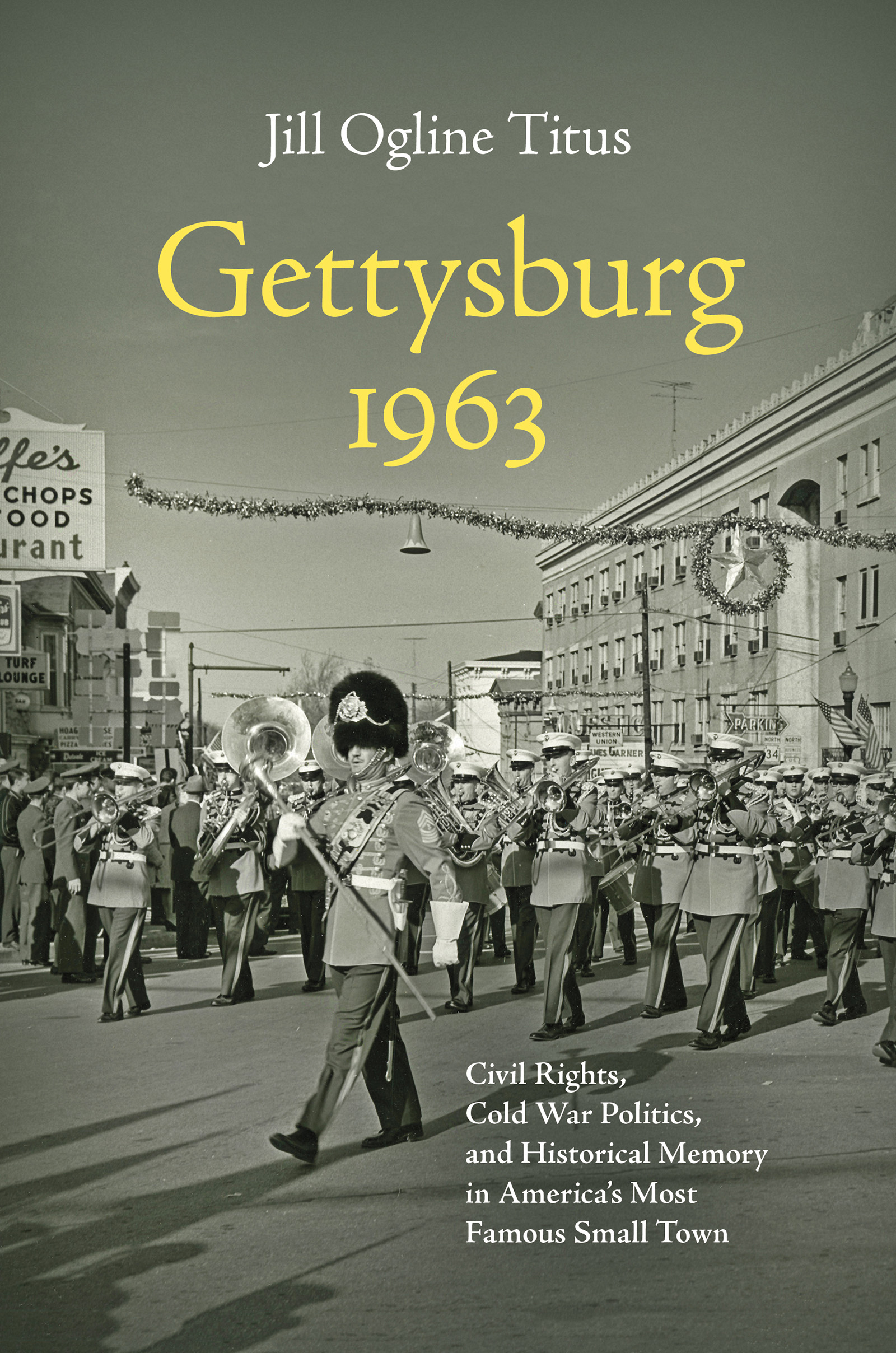
Gettysburg 1963
CIVIL WAR AMERICA
Peter S. Carmichael, Caroline E. Janney, and Aaron Sheehan-Dean, editors
This landmark series interprets broadly the history and culture of the Civil War era through the long nineteenth century and beyond. Drawing on diverse approaches and methods, the series publishes historical works that explore all aspects of the war, biographies of leading commanders, and tactical and campaign studies, along with select editions of primary sources. Together, these books shed new light on an era that remains central to our understanding of American and world history.
Gettysburg 1963
Civil Rights, Cold War Politics, and Historical Memory in Americas Most Famous Small Town
Jill Ogline Titus
The University of North Carolina PressCHAPEL HILL
2021 Jill Ogline Titus
All rights reserved
Set in Merope Basic by Westchester Publishing Services
Manufactured in the United States of America
The University of North Carolina Press has been a member of the Green Press Initiative since 2003.
Library of Congress Cataloging-in-Publication Data
Names: Titus, Jill Ogline, author.
Title: Gettysburg 1963 : civil rights, Cold War politics, and historical memory in Americas most famous small town / Jill Ogline Titus.
Other titles: Civil War America (Series)
Description: Chapel Hill : University of North Carolina Press, 2021. | Series: Civil War America | Includes bibliographical references and index.
Identifiers: LCCN 2021030563 | ISBN 9781469665337 (cloth ; alk. paper) | ISBN 9781469665344 (paperback ; alk. paper) | ISBN 9781469665351 (ebook)
Subjects: LCSH: Gettysburg, Battle of, Gettysburg, Pa., 1863Centennial celebrations, etc. | Collective memoryUnited States. | United StatesRace relationsHistory20th century. | United StatesPolitics and government20th century. | Gettysburg (Pa.)History.
Classification: LCC E475.582 .T58 2021 | DDC 973.7/349dc23
LC record available at https://lccn.loc.gov/2021030563
Cover illustration: U.S. Marine Band playing for the 1963 centennial of the Civil War in Gettysburg. Courtesy of Gettysburg College Special Collections and College Archives (MS-122_9-5_1963_MarineCorpsBand001).
Portions of chapter 5 originally appeared in Fighting Civil Rights and the Cold War: Confederate Monuments at Gettysburg, History News 71, no. 4 (Autumn 2016): 1217; they are used here with permission.
For Josiah, the best gift this time in Gettysburg has given me
The Civil War is our only felt historyhistory lived in the national imagination. This is not to say that the War is always, and by all men, felt the same way. Quite the contrary.
ROBERT PENN WARREN, The Legacy of the Civil War (1961)
Contents
Acknowledgments
This project was born at the Civil War Institute (CWI) at Gettysburg College, in the classrooms of GC, and on the fields of Gettysburg National Military Park, and it is thus to my colleagues and students that I owe my greatest debts. CWI director Pete Carmichael sat in my office with me as I pondered whether the idea was viable; his astute questions and excellent suggestions helped me realize that there was indeed a story to be told. From day one, Pete has been the projects greatest champion. He has provided invaluable feedback on countless drafts, helped me break the logjam on a key chapter, and made opportunities available that allowed me try out ideas with groups of colleagues, visiting teachers, and conference attendees. Just as importantly, he has encouraged me in moments of frustration, never doubting that the book would see the light of day. Our nearly decade-long professional partnership at CWI continues to energize me, and I am enormously grateful for his friendship and support.
My other CWI colleagues, Ashley Whitehead Luskey and Heather Miller, have likewise buoyed my spirits at difficult junctures. Their interest and support have helped me keep moving forward; I am particularly grateful to Heather for making sense of my research travel receipts and Ashley for answering random questions about 11th Corps battle lines. Also at Gettysburg College, Scott Hancock and Michael Birkner have provided valuable insight and helpful conversation. Scotts public work calling attention to the narratives unexplored on the battlefield landscape has deeply shaped my thinking about both monumentation and the responsibilities of socially engaged scholarship. Last but not least, the students with whom I am privileged to work every day have shaped this work by their insightful questions, critical observations, and passion for putting history to work in the world.
My debts at Gettysburg National Military Park are too numerous to fully enumerate, but Chris Gwinn, Greg Goodell, and John Heiser deserve special thanks. John Heiser always found a way to get me into the park library, even on woefully short notice, pointed me to vital documents, and generously shared his own extensive knowledge of the parks twentieth-century commemorative landscape. Greg Goodell not only welcomed me into the park archives but also made a time-consuming deep dive into the collection to unearth everything that could possibly be of use to me. His advice helped prepare me to productively mine the National Park Service records housed in the National Archives. Despite his busy schedule, Chris Gwinn never failed to respond to out-of-the-blue queries about both battle and postwar details. His research and interpretive programming on battlefield monuments, as well as that of Dan Vermilya, now at Eisenhower NHS, has opened new angles for me to consider, and served as a model of how to pose meaningful questions about Gettysburgs commemorative landscape. I am also grateful to Steven Semmel for citation help at a critical moment.
At the Adams County Historical Society, Andrew Dalton, Tim Smith, and Maria Lynn have gone above and beyond to help me find what I needed and to make collection materials accessible during a pandemic. Tim Smiths unparalleled knowledge of the collection led me to many important sources that I would likely have otherwise never found. Amy Lucadamo, Carolyn Sautter, Ron Couchman, and Devin McKinney at Musselman Library, Special Collections and College Archives (Gettysburg College) could not have been more generous with their time and resources, and have made my work with these collections a joy. Also at Musselman Library, Clint Baugess helped me make sense of Pennsylvania census records and tracked down countless obscure newspaper sources, working miracles despite incorrect citations.
Jonathan Stayer at the Pennsylvania State Archives and Kirk Mitchell of Special Collections, University of South Florida Libraries deserve special thanks for making sources available to me that I would have otherwise been unable to access. In sitting for interviews, Terry Fox, Jean Green, Jim Madison, and Jim Witt gave generously of their time and personal experiences, offering compelling stories and penetrating insight about Gettysburg in the 1960s. I am also indebted to Chanelle Rose, Charles Hughes, and Erin Devlin for their valuable feedback on a 2020 conference paper springing from this project. Mark Simpson-Vos, Cate Hodorowicz, and Jay Mazzocchi, and the rest of the superb team at the University of North Carolina Press, as well as series editor Carrie Janney, have been a joy to work with throughout the course of this project and have immeasurably improved the final product. I owe Carrie Janney and Robert Cook an enormous debt of gratitude for their penetrating criticism of the manuscript; any errors that remain are, of course, my own.


